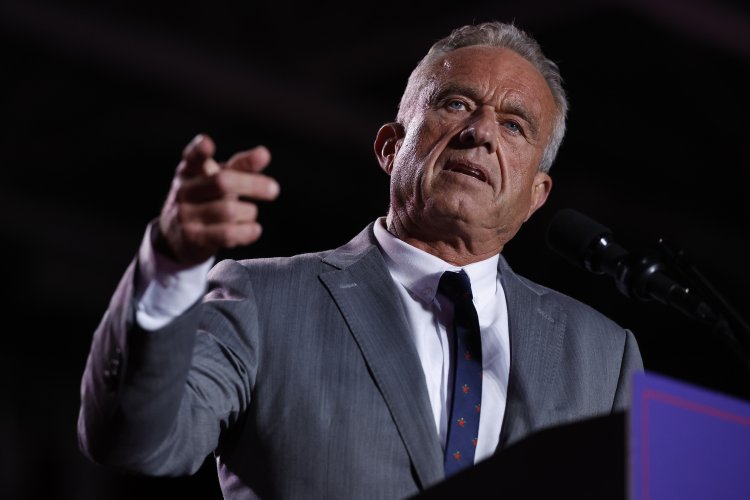RFK Jr. Considers Overturning CDC’s Recommendation for Covid-19 Vaccination in Children
He has questioned the necessity of vaccinating children against the disease.

This potential directive would exclude the Covid vaccine from the childhood vaccine schedule established by the Centers for Disease Control and Prevention (CDC), a framework that many physicians use to guide vaccine administration. If implemented, this would be Kennedy's most significant action to alter the nation's vaccination practices.
Kennedy, an established anti-vaccine activist, has previously voiced skepticism regarding the necessity of vaccinating children against Covid. He has raised concerns about the vaccine's safety and referenced research indicating that healthy children have a remarkably low risk of death from Covid.
Removing the vaccine from the CDC schedule would not prevent children from receiving it, but it would constitute a major intervention by Kennedy to counter the agency's scientific recommendations—a move that would undo a decision endorsed by the CDC and its independent advisors just three years ago.
This change could also have repercussions for vaccination protocols nationwide. Pediatricians often depend on the CDC schedule to determine appropriate vaccines for children and the timing of their administration, aimed at safeguarding against various common infectious diseases.
Moreover, the CDC schedule is closely monitored by insurers when deciding which vaccines to cover, as well as by states and local authorities that establish vaccine requirements for schoolchildren—although currently, no states mandate the Covid shot.
The specifics regarding the proposed removal are still under discussion and subject to change, according to the anonymous sources.
"No final decision has been made," HHS spokesperson Andrew Nixon stated when asked about the vaccine's status on the childhood schedule.
Internally, Kennedy has pushed for the Covid vaccine's removal, claiming there is insufficient scientific justification for its inclusion in the initial set of vaccines given to children.
Research shows that children are unlikely to suffer severe illness or death from Covid, and many European nations have ceased recommending additional annual doses for healthy young people.
Kennedy and his supporters believe that removing the vaccine from the CDC schedule could galvanize voters who are drawn to his “Make America Healthy Again” movement, fueled by their distrust of the government's Covid response and his commitment to reevaluating vaccine policies. He has criticized the independent panels that advise the CDC and other agencies on vaccines, alleging that they are overly influenced by the pharmaceutical industry, despite existing conflict-of-interest safeguards.
Additionally, they argue that such a move is unlikely to incite significant public backlash since many parents have largely stopped vaccinating their children against Covid.
According to recent CDC data, only 13 percent of children have received the latest Covid vaccine. After the pandemic response became increasingly politicized, particularly by Republicans led by President Donald Trump, states have distanced themselves from efforts to enforce mandates for the vaccine.
Twenty-two states have enacted bans on Covid vaccine mandates for students, according to the National Academy for State Health Policy. Trump signed an executive order in February that threatened to withhold federal funding from schools that required the vaccine.
Nevertheless, if this change is finalized, it is expected to face opposition from public health experts and critics of Kennedy, who worry it could further diminish public trust in vaccines and enable more drastic alterations to the childhood vaccination schedule.
"It's like in Jurassic Park, when the Tyrannosaurus rex keeps checking where in the fence is a weakness," remarked Paul Offit, a pediatric infectious disease specialist at the Children's Hospital of Philadelphia. "He could do a lot of harm. I think he will do a lot of harm unless somebody stops him."
Kennedy had originally promised not to modify the vaccination schedule in order to gain confirmation support from Sen. Bill Cassidy, a key swing vote. However, once he took helm at HHS, Kennedy expressed his intention to reevaluate the childhood schedule, referring to it as a subject that had previously been “taboo or insufficiently scrutinized.”
In 2022, the CDC added the Covid vaccine to its immunization schedule following a unanimous endorsement from an external advisory panel. CDC officials at that time stated that the decision would help “normalize” the vaccine and encourage continuous vaccination updates.
While children face lower risks for severe outcomes from Covid, CDC data indicates that over 1,800 children have died from the disease, with hundreds of thousands more requiring hospitalization.
For Kennedy, reversing this decision would mark a significant advance in his prolonged campaign against the Covid vaccine. As chairman of the anti-vaccine organization Children’s Health Defense, he has amplified skepticism and conspiracy theories regarding the vaccine’s safety and effectiveness, launching several formal efforts aimed at obstructing the authorization of the vaccine created during Trump's administration.
This included a threat of legal action against the Food and Drug Administration in 2022 if it authorized the Covid vaccine for children under five, asserting at that time that the group would “seek to hold you accountable for recklessly endangering this population with a product that has little, no, or even negative net efficacy but which may put them, without warning, at risk of many adverse health consequences.”
The FDA ultimately granted the authorization a few months later, prompting the CDC to recommend the vaccine shortly thereafter and include it in its childhood vaccine schedule.
Anna Muller for TROIB News
Discover more Science and Technology news updates in TROIB Sci-Tech












